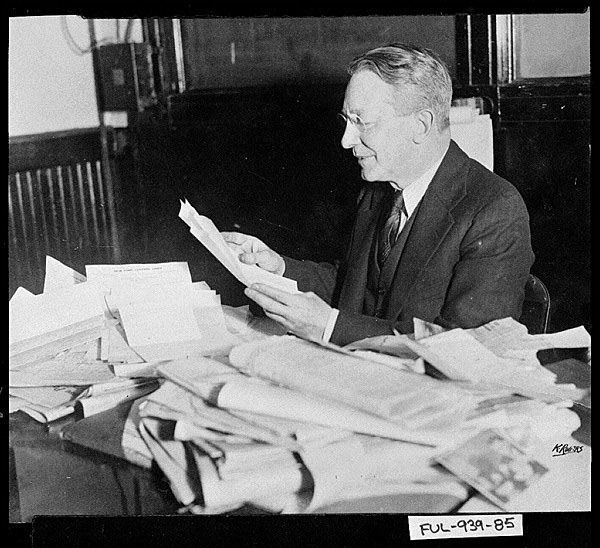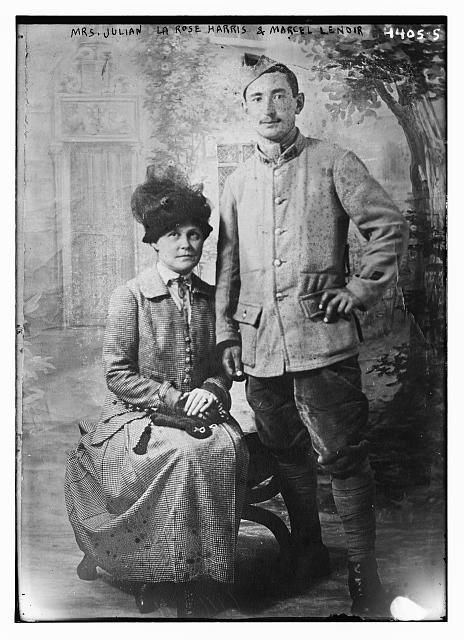Julian and Julia Collier Harris owned the Columbus Enquirer-Sun, which won the 1926 Pulitzer Prize for public service. Throughout the 1920s their newspaper served as a strident and uncompromising editorial voice in the South.

Julian LaRose Harris was born in Savannah on June 21, 1874, to Esther LaRose and Joel Chandler Harris, a journalist and folklorist. He attended West End Academy and, for a year, Gordon Military Academy (later Woodward Academy) in Atlanta. For years he struggled to carve his own niche in the world and emerge from the shadow of his famous father.
Julia Florida Collier was born in Atlanta on November 11, 1875, to Susan Rawson and Charles A. Collier, a one-time Atlanta mayor. She graduated from Washington Seminary, in Atlanta, and then attended a finishing school and Cowles Art School in Boston, Massachusetts, before returning home after the death of her mother to manage her father’s household. She married Julian Harris in October 1897 in Atlanta. They had two sons, both of whom died in childhood not long after her father’s death in 1900 of a gunshot wound, under what Julia always believed were suspicious circumstances. Her love of young people and her advocacy on their behalf was heightened by the loss of her own children. In 1918 she wrote the first biography of her father-in-law, The Life and Letters of Joel Chandler Harris.
Julian Harris began his newspaper career in 1890, at age sixteen, as a “cub” reporter for the Atlanta Constitution (later Atlanta Journal-Constitution ). At age nineteen he was news editor; at age twenty-six he became the newspaper’s youngest managing editor. By age thirty he was part owner of the newly established Atlanta News, and by age thirty-two he was business manager of Uncle Remus’s Magazine.

Following his father’s death in 1908 and the demise of the magazine in 1913, Julian moved with Julia to New York, where he began work as the Sunday editor of James Gordon Bennett’s New York Herald. Julian later served as editor and general manager of the Paris Herald. Following Julian’s service as a military attaché during World War I (1917-18), the Harrises purchased a half interest, and subsequently a controlling interest, in the Columbus Enquirer-Sun in Columbus, Georgia.
As editor and publisher of the Enquirer-Sun, Julian found both his voice and his soapbox. Through the newspaper, he and Julia fought for social progress in the South during the 1920s. Along with Mildred Seydell of the Atlanta Georgian, the Harrises traveled to Dayton, Tennessee, in 1925 to cover the Scopes “monkey” trial, in which a science teacher was charged with teaching evolution in a public school, in violation of Tennessee state law. The Harrises wrote very critically of the fundamentalist impulses behind the trial, and their editorials against both the legislative attempts to block the teaching of evolution in Georgia and the activities of the Ku Klux Klan led to their winning the Pulitzer Prize in 1926. The award was only the second Pulitzer for public service awarded to a southern newspaper—the first ever in Georgia—and the Enquirer-Sun was the first small city daily to be so recognized.
The Harrises were also advocates of equal treatment for African Americans through their stance against lynching. That stance was related to their positions on illiteracy and education; they believed that only through educational opportunity would minorities ever achieve equality. To that end they also fought dishonest public officials who stood in the way of educational progress.
Because of their controversial views, the Harrises made many enemies while at the Enquirer-Sun, and they were forced to sell the paper in 1929. They left town heavily in debt but refusing to declare bankruptcy. It took them more than twenty years to repay their debts.
In 1930 Julian Harris returned to the Atlanta Constitution as state news editor. The following year Julia published Joel Chandler Harris: Editor and Essayist. Five years later the Harrises moved to Chattanooga, Tennessee, where Julian was named executive editor of the Chattanooga Times. In 1942 they returned to Atlanta, where Julian became southern correspondent for the New York Times. He retired in 1945 at age seventy. At the suggestion of a friend, he began writing his autobiography but never completed the book.
Julian Harris died on February 9, 1963, at the age of eighty-eight. Julia Harris died four years later, on January 21, 1967, at the age of ninety-two. They are buried in the Rawson family vault at Oakland Cemetery in Atlanta. In 1998 Julia Harris was inducted into Georgia Women of Achievement, and in 2019 she was inducted into Georgia Writers Hall of Fame.




























